Like most, I have been deeply moved by the sight of prisoners released from Assad’s notorious prisons. I have been particularly upset by the discovery of the corpse of Mazen al-Hamada. I met Mazen a few years ago when he was on the panel for a screening of Sara Afshar’s extraordinary film, Syria’s Disappeared, about the hundreds of thousands of Syrians incarcerated in the prisons, many killed in secret, often after extensive and excruciating torture. During the panel, Mazen wept as he told the story of his horrific torture in the Sednaya prison. No one who met him would have forgotten him. Extraordinarily, he returned to Syria, for reasons unknown (perhaps coercion), where he was imprisoned once more and eventually murdered. His body was mutilated.
Over the weekend, I was in Doha for a conference, a sort of Qatari Davos. There were several members of the secular, democratic Arab anti-Assad opposition. Independent Diplomat supported them - the Syrian National Council (SNC) - for several years after the 2011 revolution. Their joy, relief but also sadness at the appalling bloodshed and suffering since the revolution were striking and moving.
But there is another story of the collapse of the Assad regime that is barely featuring in the western reporting. This is what’s going on in the North East.
Here, Turkish-backed militias, known as the Syrian National Army (SNA) are attacking the Syrian Democratic Forces (SDF) across the region, and in particular in Manbij in central Syria. The SDF are the multi-ethnic militia of the autonomous self-governing region of North East Syria, known to the Kurds as Rojava. This region is now under attack. Turkish aircraft and drones are also hitting SDF positions including in Kobani, a Kurdish-majority town on the northern border, and Qamishlo, the capital of the region. There are horrible videos on X of atrocities and executions committed by the SNA. Tens of thousands of Kurds have been driven out of areas around Aleppo to the West and are desperately making their way to Rojava to the East, under attack from the SNA as they flee.
This story is barely being reported. If it is, it is being described as ‘clashes’ between the SNA and SDF, rather than the deliberate and unprovoked assault that it is. The SDF do not want conflict. The government of the autonomous region has long proposed a confederal system of government for Syria, an obviously sensible suggestion given Syria’s ethnic mix. They have reached out to the Islamist HTS, which now holds the ring in Damascus, to propose peaceful co-existence and shared government. This too is being ignored. The Western discourse prefers the Orientalist story of ‘ethnic clashes’ which doesn’t require the journalists to bother to describe the details of what’s at stake.
Turkey is clearly seizing the opportunity to attack the Kurdish units whom it regards as an extension of the PKK, the Kurdistan Workers’ Party, the Kurdish organisation that has resisted government repression in Turkey for many decades and whom Turkey regards as terrorist, an appellation also adopted by the UK, US and ‘the West’, doubtless under Turkish pressure. There is a real risk that Turkey will increase its attacks and perhaps invade the region, seizing the opportunity of Western inattention, much as Israel is using the post-revolutionary moment to attack hundreds of targets across Syria with total impunity. The annihilation of Rojava is a distinct possibility, and the West is letting it happen.
What is at stake? I visited the region a few years ago and wrote a couple of articles about it, one of which follows below. It is a remarkable story. You will see why the unique dispensation in Rojava must be protected. If this story alarms you, I urge you to contact your political representatives and any journalists you may know.
….
Power to the people: a Syrian experiment in democracy
Perhaps the last place you would expect to find a thriving experiment in direct democracy is Syria. But something radical is happening, little noticed, in the eastern reaches of that fractured country, in the isolated region known to the Kurds as Rojava.
Just as remarkable, perhaps, is that the philosophy that inspired self-government here was originated by a little-known American political thinker and one-time “eco-activist” whose ideas found their way to Syria through a Kurdish leader imprisoned upon an island in the Sea of Marmara. It’s a story that bizarrely connects a war-torn Middle East with New York’s Lower East Side.
I visited Rojava last month while filming a documentary about the failings of the western model of democracy. The region covers a substantial “corner” of north-east Syria and has a population of approximately 3m, yet it is not easy to get to. The only passage is by small boat or a creaky pontoon bridge across the Tigris from Iraq.
Turkey has closed its borders with Rojava, preventing all movement from the north, including humanitarian supplies to Kurdish-controlled areas. To the south, in Iraq, the Kurdistan Regional Government does not make access easy; permits for journalists are not straightforward and, we were told, repeat visits are discouraged.
The isolation is not only physical. Turkey regards the Syrian Kurd YPG militia that is fighting the jihadi organisation Isis in Rojava as synonymous with the Kurdistan Workers’ party (PKK), a longstanding enemy inside Turkey. The YPG’s advance against Isis along Syria’s northern border has been halted by the declaration by Turkey of a so-called “safe zone” to the west of the Euphrates between the front line and the Kurdish-controlled canton of Afrin in the north-west. For the Kurds, the motive seems transparently clear: to prevent the formation of a contiguous area of Kurdish control along Turkey’s southern border.
The KRG, which collaborates with Turkey against the PKK, has also been reluctant to support the YPG, even though they share a common enemy in the shape of Isis. Turkey has likewise pressured the US to eschew the Syrian Kurds, although in the past few days Washington has come out in more open support, including delivering arms supplies to the YPG. Meanwhile, the Kurds maintain an uneasy truce with the Syrian regime, which keeps two small bases in Rojava but otherwise has no military presence here — a tacit deal whereby the Kurds control the territory in return for not fighting the regime.
Those journalists that do get here naturally gravitate to the front lines like the devastated city of Kobani; similarly, images of the photogenic young women who make up the female Kurdish militia, the YPJ, are more eye-catching than the village hall meetings that comprise the reality of an innovative grassroots democracy. But it is in those dusty assemblies across Rojava that a democratic revolution is taking place.
The onset of the Syrian revolution in 2012 saw the collapse of the Assad regime’s authority across much of Syria. When this vacuum opened in Rojava, the Kurdish Democratic Union party (PYD) sought to fill it by building a new form of democracy from the bottom up.
In this radical new dispensation, authority is vested primarily in the communal level — the village. At one assembly I attended, villagers gathered in a spartan town hall to debate their affairs. An old man began by retailing all the decisions of the previous meeting. The audience grew restive with boredom until a very young co-chair gently stopped him. Then, others took turns to voice their concerns. These were the stuff of day-to-day village life: anxiety about deliveries of medical supplies; celebration following the announcement of the opening of a small new factory for laundry powder. But the rocketing prices of bread and other basics were lamented at length. The prosaic found its voice, too: someone complained about children riding their bikes too fast around the village.
Not all decisions can be made at the most local level. Those that need broader discussion go to district or cantonal assemblies (Rojava is comprised of three cantons). Here, as in the villages, care is taken to give non-Arab minorities and women prominence. Every assembly I encountered was co-chaired by a woman. In one town, a very young Kurdish woman enthused to me that never before had people like her — “the youth” — been included in actual government. At meetings across the region I was struck by the sense of a population trying to get used to methods of self-government that were entirely unfamiliar after generations of dictatorship.
I was repeatedly told that special efforts were made to include the Arab, Assyrian and Turkmen minorities. Some Arabs confirmed this to me directly, with something resembling bewilderment. In Jazira canton, the two co-chairs of the district’s “institutions of self-government”, as this collective system is awkwardly named, consisted of an aged Arab sheikh and another young Kurdish woman. Accustomed to the traditional hierarchies of the Middle East at such gatherings, I unthinkingly addressed the senior-looking man. Without speaking, he turned to the young woman to speak for the group. She then spoke Arabic for the benefit of non-Kurdish participants.
The Arab sheikh’s guards wore black uniforms and long beards, a resemblance to Isis that suggested sympathies that may have only been conditionally suspended. Indeed, I learnt later that the sheikh had been on the Isis side until the extremists massacred members of his tribe. Inevitably, in a country where ethnic groups and allegiances are thoroughly scrambled together, the front lines are not always well defined.
A report released by Amnesty International recently claimed that the YPG has forcibly removed some Arab families from towns captured from Isis. The YPG’s response was that these examples are very few among the mass displacement of tens of thousands, and inevitable in areas of extended combat with Isis, which routinely conceals its fighters among the civilian population.
Perhaps the most remarkable feature of the democratic experiment in Rojava is the justice system that has been established alongside self-government. In Jazira, one chair of the justice committee (again a young woman) explained that since courts and punishment represented the coercive dominance of the state, such institutions had been replaced by a kind of community justice, where “social peace”, and not punishment, was the objective.
Intrigued, though a little baffled by these slogans, I asked to see what this meant in practice. The next day, I attended a mass lunch where one family hosted another. A member of the first family had killed a man from the second: lunch marked the families’ reconciliation, the culmination of a collective process of compensation, apology and forgiveness, where the perpetrator, briefly imprisoned, publicly acknowledged his crime. In turn, this act of contrition, supported by his family by means including the ceremonial meal, was accepted by the victim’s relations.
I asked the brother of the murdered man why he didn’t want the killer to face further punishment. His eyes moist with grief, he replied, no: “social peace” was more important than punishment. This was a better way, he argued: what good would be served by a long punishment of the perpetrator? I was staggered and moved. I thought of the barbarity of Rikers Island prison, which I would fly over on my way home to the US. No one in that country would claim that a system premised on punishment over reconciliation has achieved “social peace”.
Throughout the visit I met officials and ordinary citizens who enthused about the virtues of participatory, non-hierarchical self-government. I was amazed to find such a widespread consciousness of political ideas barely discussed in the rest of the world. In one town, I found myself debating the finer distinctions of anarchist philosophers — Kropotkin, Bakunin — with a youth organiser who was fluent in the discourse of people power. Where on earth had these ideas sprung from? The answer is New York City.
The reason for the strange emergence of communal self-government in Rojava became clear during my visit. Abdullah Öcalan, leader of the banned PKK party, is seen by Kurds in Syria, as well as those in Turkey, as the leader of Kurdish liberation. This despite — or in defiance of — the fact that, for the past 16 years, he has been held in a Turkish prison on an island in the Sea of Marmara.
Öcalan, 67, was once a devotee of Marxism-Leninism but came to believe that, like capitalism, communism perforce relied upon coercion (in capitalism’s case, coercion is necessary inter alia to enforce the exploitative contract between capital and labour). By chance, one book passed to him in jail was the masterwork of a New York political thinker named Murray Bookchin. Like Öcalan, Bookchin rejected communism when he became disillusioned with Stalinism’s authoritarian bent. A passionate believer in equality and freedom, he spent years teaching and arguing about anarchist philosophy in the bars and radical political groups of the city’s Lower East Side. Bookchin believed that true democracy could only prosper when decision-making belonged to the local community and was not monopolised by distant and unaccountable elites. In books such as The Ecology of Freedom (1982), he looked back to democracy’s origins in ancient Greece, where all citizens — although not, he noted, women or slaves — took turns to make political decisions.
Outside of the radical and bohemian circles of 1970s New York, Bookchin’s ideas have remained obscure, despite their pertinence today. Bookchin married what we now call environmentalism with anarchism. He believed that anarchism’s fundamental precept, the rejection of power of one over another, should apply to mankind’s relationship with the natural world. Entrapped in concrete cities, people were alienated from themselves and nature. The disasters of pollution and pillaged resources would persist as long as the false hierarchy of mankind over nature endured.
Bookchin ultimately eschewed the term “anarchist”, which he saw tainted by those who vaunted mere selfish individualism, “lifestyle anarchism”. Some kind of organised administration was, he believed, necessary to make collective decisions, as long as it included everyone: government can only be for the people when it is truly by the people. Bookchin called it “communalism”.
On his prison island, Öcalan saw that Bookchin’s concept of government without the state was ideal for the Kurds — a people who had been denied their own state. In pamphlets and books, he interpreted Bookchin’s communalism for the Kurdish context and termed it “democratic confederalism”. If you wanted a society freed of coercion, you must abolish the ultimate practitioner of coercion, including violence: the state itself. In 2004, Öcalan wrote to Bookchin and invited him to Kurdistan, but Bookchin was by then too unwell to undertake such a journey. He died two years later.
Öcalan’s new ideas were distributed across the PKK and, through them, to the Syrian Kurdish PYD. His influence in propagating a system of democracy without hierarchy presents one of the ironies of the situation in Rojava: a system that emphatically rejects all authority was inspired by a singular leader who has in the past used harsh methods to enforce organisational discipline.
In meeting after meeting I attended in Rojava, one issue generated particular emotion: emigration. My visit coincided with the tragic drowning of Aylan Kurdi, the little boy whose picture is now the symbol of the refugee crisis. That child came from Kobani, a city levelled by fighting. In the assemblies I attended, by far the loudest sentiment was frustration that people were leaving because of the desperate economic circumstances.
There were many complaints that the Turkish “embargo”, as it is universally termed in Rojava, has made life impossibly difficult. Reconstruction of devastated towns recaptured from Isis, like Kobani, was all but impossible. There was no choice but to leave. Local democracy can only fix so much when the international constraints are intractable.
To these people, the west’s acquiescence in the treatment of Rojava by Turkey and the KRG, both western allies, is bewildering. For them, these radical ideas on self-government offer a democratic model for all of Syria. One man argued to me that the centralised state, which he named the “ziggurat”, had been a catastrophe for Syria and Iraq in recent generations, an argument hard to dispute. It was self-evident, he contended, that a decentralised and inclusive structure of democracy had a better chance of producing stability — woven from the bottom up rather than imposed from the top down.
If and when there is ever a political deal to end Syria’s hideous war, this option must surely be on the table. Recent examples of Middle Eastern “state-building”, after the conflicts in Iraq and Afghanistan, however, are not encouraging. Outside states continue to prefer to construct other states that resemble themselves: the model of top-down government with its illusory offer of control is deeply ingrained. Decentralisation, particularly in the fullest sense advocated by Bookchin, threatens those used to authority — and particularly those who wield it.
One irony of Rojava’s democratic experiment is it was only made possible by the rupture of war and the effective collapse of state authority. What is happening in the west is less dramatic, but is a crisis nonetheless. The model of supposedly “representative” but hierarchical democracy as manifested in western capitals is seen as less and less representative by the people it is supposed to answer to. The fissure between the power of the wealthy and connected and everyone else is painfully evident. The desire to take power back is growing.
Rojava may seem exotic and its democratic experiment radical, but that word means a return to the root, and that is exactly what is happening in this remote corner of Syria: rule by the people; democracy returning to its roots.

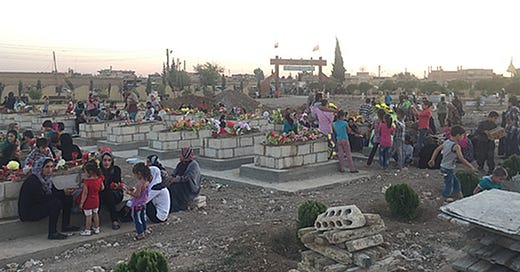


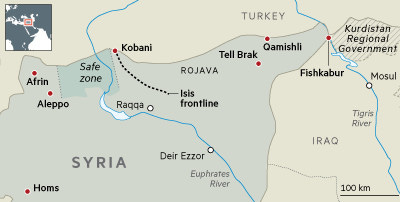

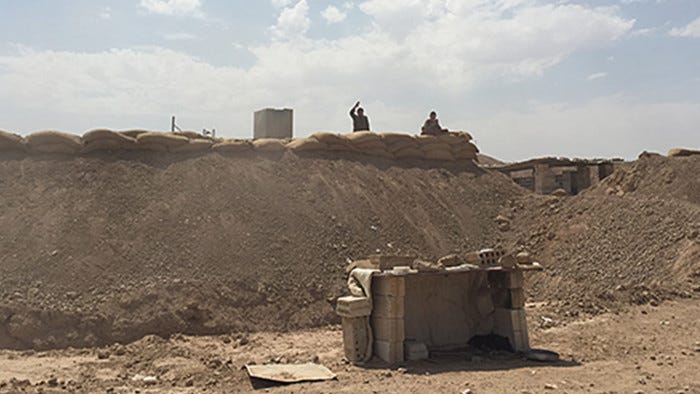
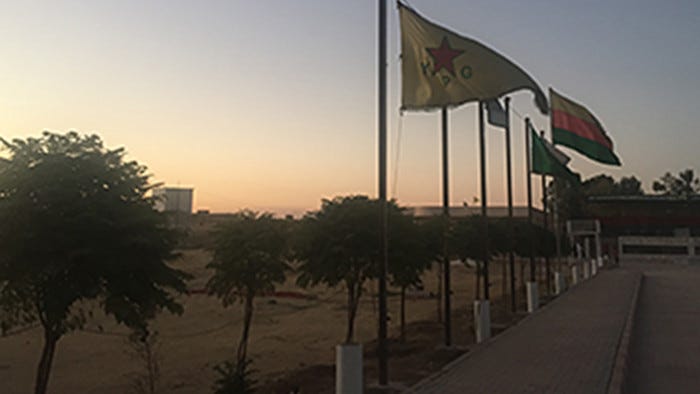
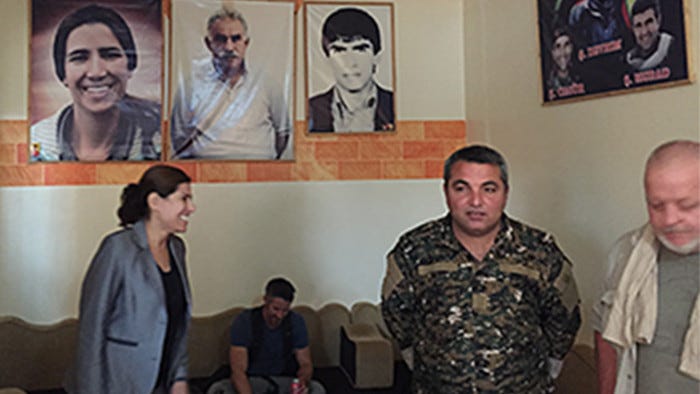
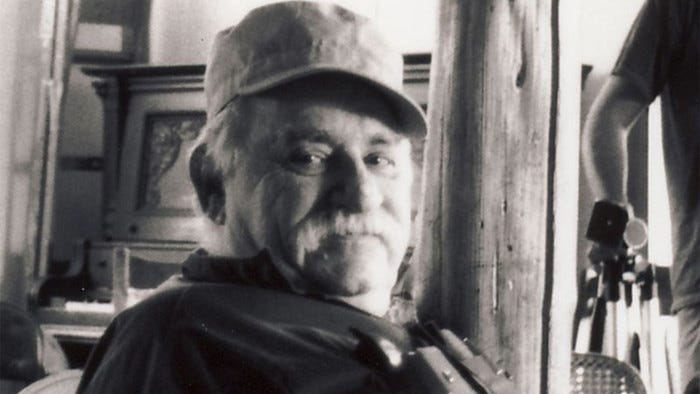
Thanks Frances. Can you raise this in parliament? Ask why the UK is not calling on Turkey to stop?
I have been donating to Rojava but what else can I do? I am deeply concerned about Rojava more than anything else it's like we're ignoring something as historically significant as the spanish civil war